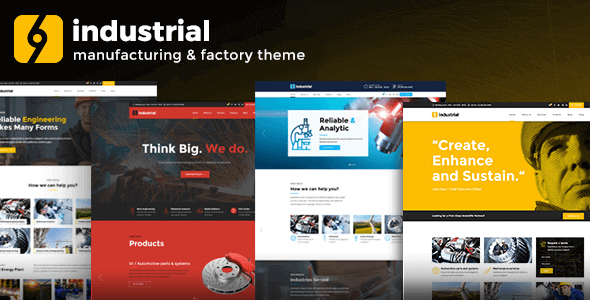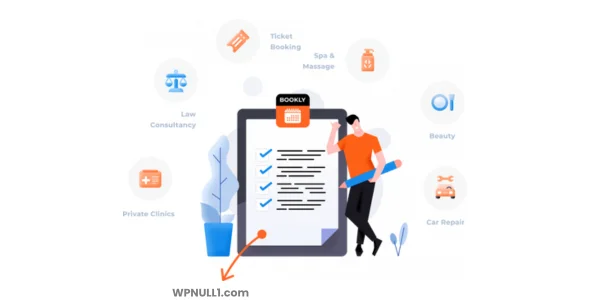Industrial Corporate, Industry & Factory Nulled is a crucial aspect of the modern economy, serving as the backbone for many sectors, from manufacturing to construction. These industries are defined by their large-scale operations, often involving heavy machinery, extensive supply chains, and a significant workforce. The dynamics of this sector have evolved dramatically over the years, adapting to new technologies and market demands. This blog post explores the world of Industrial Corporate, Industry & Factory, delving into its key characteristics, who it’s ideal for, the pros and cons, and a comparison with some popular alternatives.
1. Understanding the Industrial Sector
Industrial Corporate, Industry & Factory Free Download encompasses a wide range of businesses that are engaged in the production of goods and services. These industries are typically characterized by their large-scale production capabilities, reliance on machinery, and a structured workforce. From automotive plants to textile factories, these entities focus on creating products efficiently and cost-effectively. Over time, the sector has embraced automation, robotics, and advanced manufacturing techniques to enhance productivity and reduce human error.
The industrial sector plays a pivotal role in economic development, contributing significantly to GDP in many countries. It also supports various other sectors by providing raw materials and components necessary for different products and services. The complexity of operations, ranging from supply chain management to quality control, requires a high level of expertise and management skills.
2. Technological Advancements and Innovation
In recent years, technology has dramatically reshaped the Industrial Corporate, Industry & Factory landscape. The introduction of Industry 4.0 has brought forth a wave of digital transformation, integrating advanced technologies like the Internet of Things (IoT), artificial intelligence (AI), and big data analytics into industrial operations. These technologies have allowed factories to become ‘smart’—equipped with sensors and connected devices that provide real-time data, enabling better decision-making, predictive maintenance, and reduced downtime.
Moreover, the use of AI in quality assurance, logistics, and even in HR processes like recruitment and training has revolutionized how industries operate. The emphasis is now on not just mass production but also customization and flexibility to meet varied market demands.
3. Environmental and Regulatory Considerations
With the growing concern over environmental issues, Industrial Corporate, Industry & Factory is also under increased scrutiny regarding its impact on the environment. Many industries are significant contributors to carbon emissions, waste, and water usage, prompting a shift towards more sustainable practices. Companies are investing in green technologies, such as energy-efficient machinery and renewable energy sources, to reduce their carbon footprint and comply with stringent environmental regulations.
Regulations vary by region, but most industrial players are now required to adhere to certain standards, including waste management, emission control, and sustainable sourcing. Compliance is not just a legal obligation but also a competitive advantage as consumers and investors increasingly favor environmentally responsible companies.
Who is it Ideal For?
Industrial Corporate, Industry & Factory is ideal for businesses that require large-scale production capabilities, such as manufacturers of automobiles, electronics, clothing, and packaged goods. It’s also suitable for enterprises involved in construction, mining, and energy production, where the use of heavy machinery and a large workforce is common.
For startups and small businesses looking to scale up, entering the industrial sector can be challenging due to the high capital requirements, regulatory hurdles, and the need for specialized skills. However, those with innovative solutions or niche products can find lucrative opportunities, especially if they leverage modern technologies to offer more efficient, cost-effective, or sustainable solutions.
Pros and Cons
Pros:
- High Production Volume: Industrial sectors are capable of producing large quantities of products, which can lead to significant economies of scale.
- Technological Integration: With the advent of Industry 4.0, industries have access to advanced technologies that improve efficiency, reduce costs, and enhance product quality.
- Employment Opportunities: This sector is a major employer, providing jobs to millions globally across various skill levels.
- Economic Growth: It contributes significantly to a nation’s GDP and economic development by fostering innovation and providing essential goods.
Cons:
- High Initial Investment: Setting up industrial operations requires substantial capital investment in machinery, infrastructure, and skilled labor.
- Environmental Impact: Industries are often associated with pollution and high energy consumption, which can lead to environmental degradation if not managed properly.
- Regulatory Compliance: There is a need to constantly adapt to changing regulations, which can be both time-consuming and costly.
- Technological Dependency: With increased reliance on technology, there is also a risk associated with cybersecurity threats and technological obsolescence.
Comparison with Popular Alternatives
When considering Industrial Nulled it’s helpful to compare it with other business models or sectors that might serve similar purposes or markets. Here are four popular alternatives:
- Small-Scale Manufacturing: Small-scale manufacturing focuses on niche markets and often involves handcrafted or limited-production goods. While it offers flexibility and lower start-up costs, it lacks the economies of scale and technological advancements of large industries. This option is ideal for businesses targeting local markets or specific customer segments.
- Service-Based Industries: Unlike industrial sectors that produce tangible goods, service-based industries provide intangible services such as consulting, IT, and healthcare. These sectors require lower capital investment and have less environmental impact but may lack the robust employment opportunities and economic impact of large-scale manufacturing.
- Agricultural Sector: The agricultural sector shares some similarities with industrial manufacturing, such as the need for large-scale operations and machinery. However, it focuses on food and raw material production. While agriculture is vital for food security and rural employment, it faces its own challenges, including climate dependency and market volatility.
- Digital and E-commerce Platforms: The rise of digital and e-commerce platforms presents an alternative to traditional industries by offering direct-to-consumer models with minimal physical infrastructure. While these platforms have lower overhead costs and greater market reach, they don’t provide the same level of employment or economic contribution as traditional industrial sectors.
Industrial Free Download remains a cornerstone of economic growth and development, contributing significantly to global GDP and providing millions of jobs. While it offers substantial benefits like high production volumes and technological integration, it also faces challenges, including environmental impact and regulatory compliance. Companies must continually innovate and adopt sustainable practices to remain competitive. When comparing it to other sectors, such as small-scale manufacturing, service-based industries, agriculture, and digital platforms, each has its advantages and unique challenges. Ultimately, the choice of sector depends on a company’s resources, market goals, and strategic vision.






